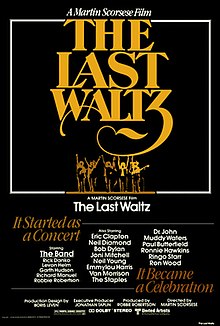
Released: April 26th,
1978
Rated: PG
Distributor: United Artists
Starring: Rick Danko, Levon Helm, Garth Hudson,
Richard Manuel, Robbie Robertson
Directed by: Martin Scorsese
Personal Bias Alert: not familiar with The Band, not big on concert films
9 of 10
Consistently
cited as one of the best concert films ever made, The Last Waltz will seem like an intimidating watch to young
viewers looking to check the boxes of cinema history. The band in the film is literally called The
Band, a successful but not infamous group that many people under 30 have probably
never have heard of, and helming the film is the seemingly unquestionable
Martin Scorsese. To watch this film and
not like it would certainly induce howls of scorn from cinephiles, but the fact
is that personal taste will always be a significant factor when it comes to
concert films. No matter how technically
sound the movie is, if you don’t care for the music, you’ll have little chance
of liking the film. This is what makes The Last Waltz so intimidating; music
from a bygone era often doesn’t play well for younger listeners. Luckily, The Band’s music is remarkably good,
likely to win over even those who are averse to their rockabilly-esque sound.
At
the time of filming, The Band consisted of Rick Danko (bass, vocals), Robbie
Robertson (guitar, vocals), Levon Helms (drums, vocals), Garth Hudson
(keyboards), and Richard Manuel (keyboards), most of whom periodically pick up
other instruments. The concert was staged
as an elaborate farewell to touring and featured appearances from other famed
performers like Bob Dylan, Eric Clapton, Joni Mitchell, and Muddy Waters, to
name a few. There’s allusions to why the
band is quitting, including the member’s ages (all in their 30’s) and the toll
that touring takes, but these musings are only half-baked observations by those
still immersed in the lifestyle and are best overlooked if you’re trying to get
the most you can from the film. It plays
best as a pure encapsulation of the concert experience, with sweeping
performances broken up by brief interview snippets that prove to be mildly
boring letdowns. Great musicians like
those in The Band give infectious performances, but their basic humanity is
always shown when they must stop and set up for the next song. It’s like an actor breaking character; one
moment they are glorious, larger-than-life figures, and the next they are
awkward things fumbling with straps and chords.
The Last Waltz, whether
intentionally or not, captures this sensation perfectly as it weaves in and out
of performances and interviews.
The
film begins with a title card stating ‘This film should be played loud!” I don’t know if anything else could give away
Scorsese’s intent, particularly for his audience to have a raucous good time,
more succinctly. It then launches into
the band’s encore and an interview in which Scorsese directs Robertson on how
to phrase a sentence. This was never
intended, Scorsese is saying, to capture precisely what happened that
night. He’s fessing up to the
manufactured nature of the film, which was limited by the practicalities of capturing
a live performance. Dylan only allowed
two of his songs to be filmed, cameras ran out of tape, and the sound recording
was so bad that most of the performances were dubbed in post-production. None of this matters, though, because
Scorsese worked tirelessly to map out as much as he could in advance and fix
anything that went wrong later. He hired
a squadron of supremely talented camera operators and storyboarded how the
performances should be captured, giving the film a tight visual style that both
covers everything that is going on but allowed for small moments, like miscues
and chuckles, to be captured in all their effervescent glory. The visuals are what set apart a concert film
from a concert album, and Scorsese uses these to capture just how much infectious
fun everyone onstage was having.
Scorsese was hired
through Robertson, and the film does suffer from focusing a bit too much on him
over the other band members. Still,
there’s no doubt that few other people would’ve been able to manage the chaos
that this production surely was better than him. The end product is a joyous romp, the
preservation of a mythical performance that never really was.
Other
Notes:
Ø Some
of the performance footage was filmed separate from the actual concert.
Ø It
took about 40 minutes for them to play a song I know, and it turned out to be
my favorite performance in the movie:
The Weight.
Ø Those
last lines are the perfect way to go out.

No comments:
Post a Comment